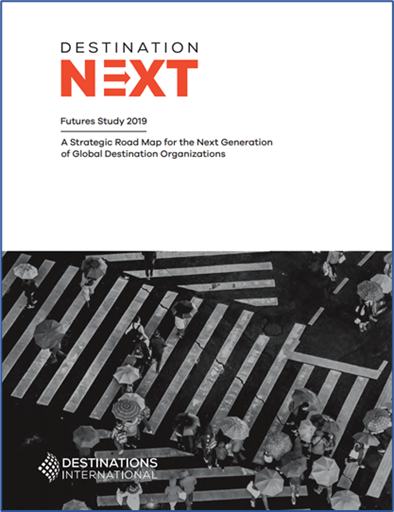By Jack Johnson, Destinations International
The Value of Stewardship
By Jack Johnson, Destinations International
In 1983, the United Nations tapped former Norwegian prime minister Gro Harlem Brundtland to run the new World Commission on Environment and Development. After decades of effort to raise living standards through industrialization, many countries were still dealing with extreme poverty. It seemed that economic development at the cost of ecological health and social equity did not lead to long-lasting prosperity. It was clear that the world needed to find a way to harmonize ecology with prosperity.
After four years, the “Brundtland Commission” released its final report, ‘Our Common Future’. It famously defines sustainable development as: development that meets the needs of the present without compromising the ability of future generations to meet their own needs. The intent of the definition was to unified environmentalism with social and economic concerns on the world’s development agenda. Sustainability is a holistic approach that considers ecological, social, and economic dimensions, recognizing that all must be considered together to find lasting prosperity.
When we speak of sustainability as a value of destination organizations, we refer to this holistic definition. It is not just the environment, but also economic and social structure of our communities.

Environmental Sustainability, when maintained, means all of our community’s environmental systems are kept in balance while natural resources are consumed at a rate that allows them to replenish themselves.
Economic Sustainability means that communities across the globe can maintain their independence and have access to the resources that they require, financial and otherwise, to meet their needs. Economic systems are intact, and activities are available to everyone to secure sources of livelihood.
Social Sustainability means that universal human rights and basic necessities are attainable by all people. They have access to enough resources to keep their families and communities healthy and secure. Healthy communities have leaders who ensure personal, labor, and cultural rights are respected and all people are included, treated equitably, and protected from discrimination.
The motivations behind sustainability are often complex, personal, and diverse, and the definition of sustainability is intentionally broad. For sustainability to remain a relevant value, concept, and tool, it is important that each industry adapt a definition to our own context. Furthermore, each destination organization must do the same.
In 2019, Destinations International’s Destination NEXT Futures Study identified, along with community alignment and digital conversion, destination stewardship as one of three industry wide transformational opportunities that destination leaders need to leverage collectively to effectively lead their organizations today.
The study spoke of building public-sector coalitions between the visitor industry, economic development agencies, academic institutions, and civic and philanthropic organizations. The goal is to curate more immersive destination experiences, manage sustainable visitor growth, promote equitable economic development, and elevate quality of life and quality of place.

From the 2019 Destination Next Futures Study.
“The most significant shift overall for destination organizations worldwide is the expanding role from destination marketing to destination management. According to the UNWTO in May 2019, “Destination management addresses the interactions between visitors, the industry that serves them, the community that hosts them, and the environment (natural, built and cultural).”
A growing number of destination leaders prefer the term “destination stewardship,” which speaks more to the growing role they have in influencing how government, the industry, visitors and residents interact, rather than directly “managing” the destination in any literal sense.
Today, destination organizations are focusing more intentionally on developing new destination experiences and stakeholder networks that incorporate a wider breadth of local companies and organizations, including many outside the tourism and hospitality industry.
This is because there’s greater awareness today about how the visitor economy can be leveraged more effectively to drive equitable and sustainable economic development that benefits a broader spectrum of communities in a destination.
Likewise, destination leaders are collaborating more strategically with local organizations and residents to develop more community-driven visitor experiences.
In addition, destination organizations are stewarding their cities through many political, social, economic, and environmental challenges disrupting the global visitor industry. They are expanding resources dedicated to developing inclusivity and diversity initiatives; improving workforce development and customer service training; increasing partner education around emerging technologies and consumer trends; addressing myriad social issues impacting both the community and the visitor experience; and a host of other non-sales and marketing responsibilities.
That said, destination stewardship is not about distracting destination organizations from their traditional roles of promoting the region and driving higher visitor volume and spend.
Rather, by expanding their organization’s role in destination development and community building, destination leaders can increase sales and marketing opportunities because there’s a more immersive, connected, multidisciplinary visitor experience, and a more layered brand story to promote to the world.”
For destination organizations, sustainability comes down one more level and is centered on the kind of future our community is leaving for the next generation. But it is also about growing our community in a manner that sustains the elements that makes our destinations unique and attractive. It is about taking a holistic approach to the brand of our destination, articulating it, defending it, and promoting it. It is about taking that same approach to all our destination promotion efforts. And finally, sustainability is a value we need to demonstrate in our policies, everyday activities, and behaviors.
To date we have covered six key values in the operation of a destination organization. Each new value builds upon the last and when looked at together provides a roadmap to becoming a community shared value. We started with passion and awareness which drives us in everything we do. Next came the values of transparency and inclusion, critical in building trust with a community. Those four values lay the groundwork for the next two values of engagement and collaboration which will put you into the community working with its stakeholders. Your experience and ability for innovation and your role in destination stewardship make you a sought-after partner.

